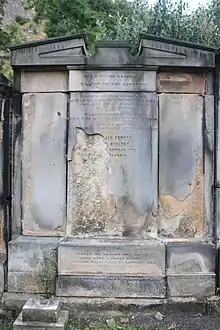William Penney, Lord Kinloch
The Hon William Penney, Lord Kinloch (1801–1872) was a Scottish judge, and Senator of the College of Justice.
Life

The son of William Penney, a manufacturer at Castlepens Wynd in Glasgow,[1] and Elizabeth, daughter of David Johnston, D.D., North Leith, was born in Glasgow and studied Law at Glasgow University. He entered the office of Alexander Morrison, a solicitor, and then spent some time in an accountant's office.[2]
In 1824 Penney was called to the Scottish bar, and gained a practice, mainly in commercial cases. In politics he was a conservative.
In 1845 he was working in Edinburgh as an advocate, living at 24 Great King Street in Edinburgh's Second New Town.[3]
He was raised to the bench on the recommendation of Lord Derby, in May 1858, on the death of Robert Handyside, Lord Handyside, taking the title of "Lord Kinloch". When a vacancy occurred in the inner house of the court of session, on Lord Curriehill's death, Penney succeeded to the post in 1868.[2]
Penney died at Hartrigge House, near Jedburgh, on 31 October 1872.[2]
He is buried in St Cuthbert's Churchyard in Edinburgh.[4] The grave lies on a boundary wall in the southern section. His wife, Louisa Jane Campbell (1814-1887) was buried independently at Dean Cemetery.
Works
Penney was the author of religious works in prose and verse:[2]
- ‘The Circle of Christian Doctrine, a Handbook of Faith, framed out of a Layman's Experience,’ Edinburgh, 1861; 2nd ed. 1861; 3rd ed. 1865.
- ‘Time's Treasure, or Devout Thoughts for every Day of the Year, expressed in verse,’ Edinburgh, 1863; 2nd ed. 1863; 3rd ed. 1865. A selection entitled ‘Devout Moments’ appeared in 1866.
- ‘Studies for Sunday Evening,’ Edinburgh, 1866.
- ‘Faith's Jewels presented in Verse, with other Devout Verses,’ Edinburgh, 1869.
- ‘Thoughts of Christ for every Day in the Year,’ London, 1871.
- ‘Readings in Holy Writ,’ Edinburgh, 1871.
- ‘Hymns to Christ,’ Edinburgh, 1872.
Family
Penney was twice married: first, in 1828, to Janet, daughter of Charles Campbell of Lecknary, Argyllshire (died 1839); and, secondly, in 1842, to Louisa, daughter of John Campbell of Kinloch, Perthshire. He left five sons and seven daughters.[2]
Notes
- Glasgow Post Office Directory 1801
- Lee, Sidney, ed. (1895). . Dictionary of National Biography. 44. London: Smith, Elder & Co.
- Edinburgh Post Office Directory 1845
- Monuments and monumental inscriptions in Scotland: The Grampian Society, 1871
- Attribution
![]() This article incorporates text from a publication now in the public domain: Lee, Sidney, ed. (1895). "Penney, William". Dictionary of National Biography. 44. London: Smith, Elder & Co.
This article incorporates text from a publication now in the public domain: Lee, Sidney, ed. (1895). "Penney, William". Dictionary of National Biography. 44. London: Smith, Elder & Co.